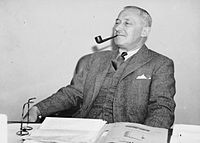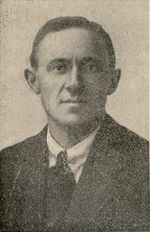- Manny Shinwell, Baron Shinwell
-
The Lord Shinwell
CH, PC
Minister of Defence In office
28 February 1950 – 26 October 1951Prime Minister Clement Attlee Preceded by A. V. Alexander Succeeded by Winston Churchill Secretary of State for War In office
7 October 1947 – 28 February 1950Prime Minister Clement Attlee Preceded by Frederick Bellenger Succeeded by John Strachey Personal details Born 18 October 1884
Spitalfields, LondonDied 8 May 1986 (aged 101) Nationality British Political party Labour Emanuel Shinwell, Baron Shinwell CH, PC (18 October 1884 – 8 May 1986), familiarly known as Manny, was a British trade union official, Labour politician and one of the leading figures of Red Clydeside.
Contents
Early life, career and trade union activities
Shinwell was born in Spitalfields, London, but moved with his Polish–Jewish family to Glasgow, Scotland. His father had a small clothing shop and his mother was a cook. He educated himself in a public library and at the Kelvingrove Art Gallery. He enjoyed sport, particularly boxing, and he was the trainer of a local football team. He began his working life as a machinist in a clothing workshop. In 1903 he became active in the Amalgamated Union of Clothing Operatives, and joined the Glasgow Trades Council in 1906 as a delegate of that union.
In May 1911, he was seconded to help organise the seamen of Glasgow at the request of J. Havelock Wilson of the National Sailors' and Firemen's Union (NSFU). He played a prominent role in the six-week Glasgow seamen's strike which began on 14 June and which was part of a nationwide strike. He subsequently became the secretary of the Glasgow branch of the NSFU. In August 1912, he participated in a revolt against the union, which resulted in the Glasgow branch becoming part of the Southampton-based British Seafarers' Union (BSU). He was the local secretary of the BSU until it became part of the Amalgamated Marine Workers' Union (AMWU) in 1922, after which he served as National Organiser of the new organisation. In 1919, he gained national notoriety through his involvement in the Glasgow 40 Hours' Movement. This movement culminated in clashes between police and protesters in Glasgow's George Square. He was afterwards tried for incitement to riot and was sentenced to five months' imprisonment.
Political career
An Independent Labour Party (ILP) member, he was elected as Member of Parliament (MP) for Linlithgowshire at the 1922 general election. He lost his seat in 1924, but was re-elected for Linlithgowshire at a by-election in 1928. In 1929 Ramsay MacDonald appointed him Financial Secretary to the War Office: Cowling says that MacDonald believed he had rescued Shinwell's ministerial career when no minister would take him. From 1930 Shinwell served as Secretary for Mines, an office he had previously held in 1924. He became a critic of Ramsay MacDonald's National Government, and in 1931 he again lost his seat. He returned to the Commons in 1935 for Seaham, County Durham, after defeating MacDonald, whereafter he campaigned vigorously, along with left-wingers such as Aneurin Bevan, for Britain to support the Popular Front government in Spain against Franco in the Spanish Civil War. On 4 April 1938, during a heated House of Commons debate in which he had been criticising the government's foreign policy, he slapped the face of the Conservative MP Commander Robert Tatton Bower after Bower told him to "go back to Poland".[1] Shinwell had taken this to be an anti-semitic remark.[2] In May 1940 he refused a position in Winston Churchill's Coalition Government in the Ministry of Food. He became chairman of the Labour Party in 1942.
He served in Clement Attlee's government after the Labour victory in 1945. As Minister of Fuel and Power, he presided over the nationalisation of the mining industry. His decision to mine the grounds of Wentworth Woodhouse, home of the former mine owners, the Earls Fitzwilliam, was severely criticised, including by the miners themselves (who threatened to strike in an attempt to prevent it), and was perceived as an act of class warfare. The Fitzwilliam family for decades, unlike most mine owners, had made the Wentworth Estate a welcoming retreat for all miners, making them welcome to roam the estate and allowing the miners to approach Wentworth Woodhouse and knock on the door for help at anytime. Locals in Wentworth to this day say Shinwell mined the grounds not because he needed to, but because he could.
In 1947, Britain experienced, in an exceptonally severe winter, a serious coal shortage. He was widely criticised for his failure to avert this crisis. Shortly afterwards he took up the position of Secretary of State for War which he held until 1950. His seat became Easington in 1950, at which point he became Minister of Defence. Towards the end of his Commons career, he served as Chairman of the Parliamentary Labour Party, 1964-67. Shinwell was awarded the Order of the Companions of Honour and made Baron Shinwell, of Easington in County Durham, in 1970, and died in 1986, aged 101, holding the record for the second longest-lived British MP (after Theodore Cooke Taylor) until overtaken by Bert Hazell in November 2008. He became the longest lived peer on 26 March 1986, dying little over a month later on 8 May.
Portrait bust of Lord Shinwell
Shinwell sat for sculptor Alan Thornhill for a portrait[3] in clay. The correspondence file relating to the Shinwell portrait bust is held as part of the Thornhill Papers (2006:56) in the archive[4] of the Henry Moore Foundation's Henry Moore Institute in Leeds and the terracotta remains in the collection of the artist. A bronze (accession number S.309) was purchased into the Collection of Glasgow City Art Gallery[5] in 1973.
References
- ^ http://hansard.millbanksystems.com/commons/1938/apr/04/spain
- ^ http://www.time.com/time/magazine/article/0,9171,759518,00.html
- ^ portrait head of Lord Shinwell image of sculpture
- ^ http://www.henry-moore-fdn.co.uk/matrix_engine/content.php?page_id=584 HMI Archive
- ^ Kelvingrove Art Gallery and Museum
Bibliography
Shinwell wrote three volumes of autobiography:
- Conflict Without Malice (1955)
- I've Lived Through it All (1973)
- Lead With the Left (1981)
Shinwell wrote "When The Men Come Home" (1944)
- Cowling, Maurice, The Impact of Hitler - British Policies and Policy 1933-1940, Cambridge University Press, 1975, p. 416, ISBN 0-521-20582-4
Archives
External links
- Hansard 1803–2005: contributions in Parliament by Manny Shinwell
Parliament of the United Kingdom Preceded by
James KiddMember of Parliament for Linlithgowshire
1922–1924Succeeded by
James KiddPreceded by
James KiddMember of Parliament for Linlithgowshire
1928–1931Succeeded by
Adrian BailliePreceded by
Ramsay MacdonaldMember of Parliament for Seaham
1935–1950Constituency abolished New constituency Member of Parliament for Easington
1950–1970Succeeded by
Jack DormandPreceded by
Winston ChurchillOldest sitting member
(nb not Father of the House)
1964 - 1970Succeeded by
S. O. DaviesPolitical offices Preceded by
George Lane-FoxSecretary for Mines
1924Succeeded by
George Lane-FoxPreceded by
Duff CooperFinancial Secretary to the War Office
1929–1930Succeeded by
William SandersPreceded by
Ben TurnerSecretary for Mines
1930 - 1931Succeeded by
Isaac FootPreceded by
Gwilym Lloyd GeorgeMinister of Fuel, Light and Power
1945 - 1947Succeeded by
Hugh GaitskellPreceded by
Philip Noel-BakerChair of the Labour Party
1947–1948Succeeded by
Jim GriffithsPreceded by
Frederick BellengerSecretary of State for War
1947–1950Succeeded by
John StracheyPreceded by
A. V. AlexanderMinister of Defence
1950–1951Succeeded by
Winston ChurchillSecretaries of State for Defence of the United Kingdom Ministers for Defence Winston Churchill · Clement Attlee · A. V. Alexander · Manny Shinwell · Winston Churchill · The Earl Alexander of Tunis · Harold Macmillan · Selwyn Lloyd · Sir Walter Monckton · Anthony Head · Duncan Sandys · Harold Watkinson · Peter ThorneycroftSecretaries of State for Defence Peter Thorneycroft · Denis Healey · The Lord Carrington · Ian Gilmour · Roy Mason · Fred Mulley · Francis Pym · John Nott · Michael Heseltine · George Younger · Tom King · Malcolm Rifkind · Michael Portillo · George Robertson · Geoff Hoon · John Reid · Des Browne · John Hutton · Bob Ainsworth · Liam Fox · Philip HammondCategories:- 1884 births
- 1986 deaths
- Members of the United Kingdom Parliament for English constituencies
- Members of the United Kingdom Parliament for Scottish constituencies
- British Secretaries of State
- British trade unionists
- British centenarians
- Labour Party (UK) life peers
- Scottish politicians
- Labour Party (UK) MPs
- English Jews
- Scottish Jews
- Anglo-Scots
- People from Spitalfields
- Members of the Order of the Companions of Honour
- People associated with Glasgow
- UK MPs 1922–1923
- UK MPs 1923–1924
- UK MPs 1924–1929
- UK MPs 1929–1931
- UK MPs 1935–1945
- UK MPs 1945–1950
- UK MPs 1950–1951
- UK MPs 1951–1955
- UK MPs 1955–1959
- UK MPs 1959–1964
- UK MPs 1964–1966
- UK MPs 1966–1970
- Secretaries of State for War (UK)
- Members of the Privy Council of the United Kingdom
- Red Clydeside
Wikimedia Foundation. 2010.


